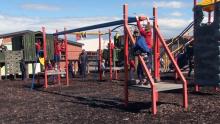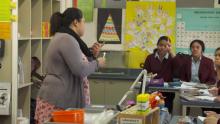- Topics: Aiga, Assessment, Early mathematics, Pacific, Professional development
- Published: 24 Apr 2018
Evaluation at a glance: A decade of assessment in New Zealand Primary Schools - Practice and trends
High quality assessment and evaluation allows us to focus on student progress and outcomes at classroom, school and system levels. It helps teachers, schools and systems to report on student achievement across points in time, and provide information for parents, trustees and the public about the quality of education.
- Published: 04 Sep 2017
Shared ownership
Senior leaders at Invercargill Middle School have put processes in place to ensure that all teachers participate in and contribute to the co-construction of decisions about how best to move forward. The principal describes the approach as ‘change coming from the classroom, not the principals office’.
- Published: 04 Sep 2017
Professional learning
Professional learning reflects the approach that has been established for students. Learning is differentiated with multiple opportunities for engagement and structure in manageable steps.
This video was filmed at McAuley High School.
- Published: 04 Sep 2017
Professional inquiry
Inquiry is at the heart of what drives improvement and innovation at McAuley High School.
- Published: 04 Sep 2017
Student feedback: promoting teacher learning
At McAuley High School, leaders and teachers actively model learning behaviour for the students including eliciting student feedback on a regular basis
- Published: 04 Sep 2017
Teacher collaboration: professional learning in modern learning environments
Working together to determine what the collaboration and teamwork looks like on a day-to-day basis has been a critical and continued focus of professional learning and team dialogue at Stonefields School.
- Published: 04 Sep 2017
Visible professional learning
At McAuley High School, classroom teacher observations are a frequent occurrence and students report how they regard this as teachers actively modelling learning behaviour.
- Published: 25 Aug 2016
Partners in Learning
Strong connections between schools and parents and whānau are essential to accelerating the achievement of our kids, particularly those at risk of underachieving. This booklet helps parents, families and whānau to form effective relationships and educationally powerful connections.
- Published: 22 Mar 2016
Early mathematics: a guide for improving teaching and learning
This guide describes how children can be supported to become confident and capable mathematical learners in the early years.
- Published: 14 Mar 2014
Your child's education
These booklets have been written for everyone who parents a child - those who have care and responsibility for children attending a school. The booklets include questions you can ask, as well as general information that you may find useful. Click on the booklet to read and download.
Your child's education is an overview of education in New Zealand, from early childhood education through to secondary school. The information and questions are a useful insight into what education looks like in New Zealand and the opportunities available to your child.
- Published: 01 Nov 2013
Priorities for Childrens Learning in Early Childhood Services: Good Practice
This good practice report presents examples from five early childhood services where priorities for children’s learning were well considered and reflected on.
- Published: 31 May 2013
Accelerating the Progress of Priority Learners in Primary Schools
This national report presents the findings of ERO’s recent evaluation about the extent to which primary schools were using effective strategies to improve outcomes for priority groups of learners. In this report ‘priority learners’ refers to Māori, Pacific, special needs, and students from low income families, who are not achieving at or above National Standards.
- Published: 27 May 2013
Priorities for Children's Learning in Early Childhood Services
This national report is one of two reports that present the findings of a 2012 national evaluation about curriculum priorities.
- Published: 01 Nov 2007
The Quality of Assessment in Early Childhood Education
Assessment informs an early childhood service’s programme and educators’ teaching practices. ERO evaluated the quality of assessment in all the early childhood services reviewed in Terms 3 and 4, 2006.
Services were at varying stages in their understanding and implementation of assessment practices, as not all had yet participated in professional development.
- Published: 01 Jun 2007
The Collection and Use of Assessment Information: Good Practice in Secondary Schools
ERO evaluated the collection and use of assessment information in schools in 2006. The evaluation concluded that more work can be done to improve assessment practice in schools. This complementary report aims to help secondary schools review their assessment practice. It highlights characteristics common to high quality assessment practices and includes examples of good practice.
- Published: 01 Jun 2007
The Collection and Use of Assessment Information: Good Practice in Primary Schools
ERO evaluated the collection and use of assessment information in schools in 2006. The evaluation concluded that more work can be done to improve assessment practice in schools. This report builds on this finding by giving examples of good practice in the collection and use of assessment information in primary schools. The report also includes three detailed case studies.
- Published: 01 Mar 2007
The Collection and Use of Assessment Information in Schools
Knowing what students know and can do is fundamental to effective teaching and students’ learning. Teachers need to assess student achievement to know whether or not their teaching is meeting the learning needs of their students.
In 2006, ERO evaluated how effectively schools collected and used assessment information. This report details the findings of that evaluation and recommends what can be done to make assessment practices in schools more effective.
















